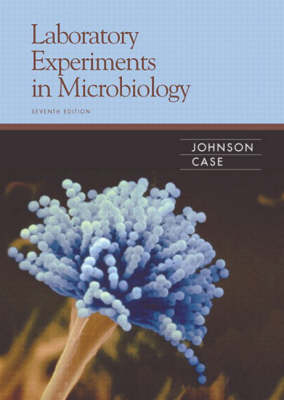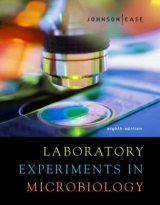
Laboratory Experiments in Microbiology
Pearson Education (US) (Verlag)
978-0-8053-7673-9 (ISBN)
- Titel erscheint in neuer Auflage
- Artikel merken
Newly revised to accompany Microbiology: An Introduction , Eighth Edition by Tortora, Funke, and Case, this lab manual includes 57 experiments that demonstrate the broad spectrum of microbiology.
Intended as a manual of basic microbiological techniques, this popular lab manual features applications for undergraduate students in diverse areas, including the biological sciences, the allied health sciences, agriculture, environmental science, nutrition, pharmacy, and various pre-professional programs. Experiments have been refined in this new edition to encourage students to develop critical-thinking skills as well as learn basic facts and technical skills. Material with direct application to clinical and commercial labs is included wherever possible, and increased emphasis is placed on lab safety.
Introduction.
I. MICROSCOPY.
1. Use and Care of the Microscope.
2. Examination of Living Microorganisms.
II. STAINING METHODS.
3. Preparation of Smears and Simple Staining.
4. Negative Staining.
5. Gram Staining.
6. Acid-fast Staining.
7. Structural Stains (Endospore, Capsule, Flagella).
8. Morphologic Unknown.
III. CULTIVATION OF BACTERIA.
9. Microbes in the Environment.
10. Transfer of Bacteria: Aseptic Techniques.
11. Isolation of Bacteria by Dilution Technique.
12. Special Media for Isolating Bacteria.
IV. MICROBIAL METABOLISM.
13. Carbohydrate Catabolism.
14. Fermentation of Carbohydrates.
15. Protein Catabolism, Part 1.
16. Protein Catabolism, Part 2.
17. Respiration.
18. Rapid Identification Methods.
V. MICROBIAL GROWTH.
19. Oxygen and the Growth of Bacteria.
20. Determination of a Bacterial Growth Curve: The Role of Temperature.
21. Other Influences on Microbial Growth: Osmotic Pressure and pH.
VI. CONTROL OF MICROBIAL GROWTH.
22. Physical Methods of Control: Heat.
23. Physical Methods of Control: Ultraviolet Radiation.
24. Chemical Methods of Control: Disinfectants and Antiseptics.
25. Chemical Methods of Control: Antimicrobial Drugs.
26. Effectiveness of Hand Scrubbing.
VII. MICROBIAL GENETICS.
27. Regulation of Gene Expression.
28. Isolation of Bacterial Mutants.
29. Isolation of DNA.
30. DNA Fingerprinting.
31. Transformation and Genetic Engineering.
32. Ames Test for Detecting Possible Chemical Carcinogens.
VIII. THE MICROBIAL WORLD.
33. Unknown Identification and Bergey's Manual.
34. Fungi: Yeasts.
35. Fungi: Molds.
36. Phototrophs: Algae and Cyanobacteria.
37. Protozoa.
IX. VIRUSES.
38. Isolation and Titration of Bacteriophages.
39. Plant Viruses.
X. INTERACTION OF MICROBE AND HOST.
40. Epidemiology.
41. Koch's Postulate.
XI. IMMUNOLOGY.
42. Nonspecific Response.
43. Blood Group Determination: Slide Agglutination.
44. Agglutination Reactions: Microtiter Agglutination.
45. ELISA Technique.
XII. MICROORGANISMS AND DISEASE.
46. Bacteria of the Skin.
47. Bacteria of the Respiratory Tract.
48. Bacteria of the Mouth.
49. Bacteria of the Gastrointestinal Tract.
50. Bacteria of the Urogenital Tract.
51. Identification of an Unknown from a Clinical Sample.
XIII. MICROBIOLOGY AND THE ENVIRONMENT.
52. Microbes in Water: Multiple-Tube Technique.
53. Microbes in Water: Membrane Filter Technique.
54. Microbes in Food: Contamination.
55. Microbes Used in the Production of Foods.
56. Microbes in Soil: The Nitrogen and Sulfur Cycles.
57. Microbes in Soil: Bioremediaton.
APPENDICES.
A. Pipetting.
B. Dilution Techniques and Calculations.
C. Use of the Spectrophotometer.
D. Graphing.
E. Use of the Dissecting Membrane.
F. Use of the Membrane Filter.
G. Electrophoresis.
H. Keys to Bacteria.
Index.
| Erscheint lt. Verlag | 22.5.2003 |
|---|---|
| Verlagsort | Upper Saddle River |
| Sprache | englisch |
| Gewicht | 972 g |
| Themenwelt | Naturwissenschaften ► Biologie ► Mikrobiologie / Immunologie |
| ISBN-10 | 0-8053-7673-9 / 0805376739 |
| ISBN-13 | 978-0-8053-7673-9 / 9780805376739 |
| Zustand | Neuware |
| Informationen gemäß Produktsicherheitsverordnung (GPSR) | |
| Haben Sie eine Frage zum Produkt? |
aus dem Bereich



